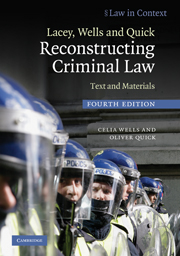Book contents
- Frontmatter
- Contents
- Preface
- Table of cases
- Table of statutes
- Section I Approaching Criminal Law
- Section II Law, Order and Security
- Section III Interpersonal Violence; Drugs and Alcohol Abuse; Offence Preparation and Participation
- Section IV Property and Propriety
- Section V Regulating Sexuality and Bodily autonomy
- Section VI Making a Killing
- Bibliography
- Index
Section III - Interpersonal Violence; Drugs and Alcohol Abuse; Offence Preparation and Participation
Published online by Cambridge University Press: 05 June 2012
- Frontmatter
- Contents
- Preface
- Table of cases
- Table of statutes
- Section I Approaching Criminal Law
- Section II Law, Order and Security
- Section III Interpersonal Violence; Drugs and Alcohol Abuse; Offence Preparation and Participation
- Section IV Property and Propriety
- Section V Regulating Sexuality and Bodily autonomy
- Section VI Making a Killing
- Bibliography
- Index
Summary
We have already laid the foundations for this Section since in many cases the disorder offences discussed in Chapter 6 dovetail with those of personal violence (assault, wounding and so on) that form the subject of Chapter 8 below. Arguments about the regulation of drug and alcohol use, including the construction of the dangerous deviant and the doctrinal relevance of intoxication to criminal liability, are then canvassed in Chapter 9. We conclude with an introduction to inchoate and secondary modes of liability. Inchoate modes such as conspiracy, attempt and the recent introduction of offences of assisting or encouraging crime allow liability even though an offence is not complete. Participation or secondary liability (also known as complicity, or aiding and abetting) is a method of attaching liability for completed offences, considerably broadening the circle of liability.
Taken together the three chapters in this Section continue to illustrate the continuity between the narrow, ‘literal’ conception of criminal law doctrine and the broad, political and ‘metaphysical’ conception with which we would argue law is equally concerned. We have met the challenge of understanding criminal law in these broad contexts by examining both substantive offences and the conditions for criminal responsibility. One important issue is how criminal law responds to the (not uncommon situation of) the defendant who claims not to have known what she was doing because she was drunk.
- Type
- Chapter
- Information
- Lacey, Wells and Quick Reconstructing Criminal LawText and Materials, pp. 231 - 232Publisher: Cambridge University PressPrint publication year: 2010



